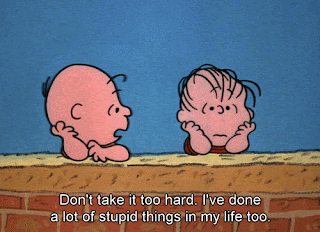Some things aren't meant to happen.
That's why it is so frustrating to keep believing they can still make it against all the odds.
However, even those things that aren't meant to happen end up happening sometimes, right?
If we are told that something isn't meant to happen, that does not necessarily mean that there is no chance it will happen ..., right?
If we are told that something isn't meant to happen, that does not necessarily mean that there is no chance it will happen ..., right?
So, there are chances that the whole thing about "things that aren't meant to happen" may actually be about our persistence to make things happen ...Am I right...? Or am I wrong...? So confusing. :) So confused.
How do we know that something isn't meant to happen? Is that to be judged based on how many obstacles we need to overcome on our way to the point that we marked as our destination...? Or do we figure out that something is not meant to be based on how much luck we have on our road to seeing something happen? If you constantly fail, if you are constantly interrupted by something or someone, does that mean that something just isn't "meant to be" despite all your sincere efforts? Failing and rising....Saving up strength, then wasting it.... Ups and downs....And trying over and over again.... How do we know that we should give up on something? How can we be sure that we are right to give up?
Should we do a cost-benefit analysis? I mean - sure, if it is an financial decision :) ... But what is it if it's about relationships (our friends, families, partners...) ? What is use of cost-benefit analysis then?
Should we do a cost-benefit analysis? I mean - sure, if it is an financial decision :) ... But what is it if it's about relationships (our friends, families, partners...) ? What is use of cost-benefit analysis then?
I was studying Career Management this semester, and one of the things that really made an impact of me was the quote of Donald Super (famous psychologist, creator of one of the most influential theories of career development) which said that when there is enough knowledge, there is no such thing as a coincidence. Basically, most of the things we are involved into are the consequences of our own choices. Persons we chose to be with, fields that we determine to study, etc.
I despise thinking that everything about us and around is determined. I believe that we are the ones choosing what will happen next in most of the cases. Sure, there are some things we can't control...We do not know whether we'll get struck by lightening or hit by a car; whether we'll end up ill (although we can partly affect that as well)... we can't choose a country in which we are born and raised, we cannot choose who are our parents, brothers or sisters etc. However, at many life's crossroads, in most cases, we are the ones determining which path we're choosing. And if we know where we're going determined that we want to get there, who the hell is "Destiny" to tell us that something cannot be done??
"There is no chance, no destiny, no fate, that can circumvent or hinder or control the firm resolve of a determined soul." -Ella Wheeler Wilcox
Disney movie - Mulan. Inspiring in so many ways.
The most important question is, however- is someone or something worth of all the effort and persistence... Is it reasonable to sacrifice your own energy, your own time and effort to achieve what you have intended? If you are going against all the odds, you should be damn right certain what are the reasons for doing all of that... It is those reasons that are necessary for determination to be strong.
In the end, you are the one responsible for the steps you are taking. You are the one who needs to handle the difficulties and the weight of your choice, the consequences that can be quite rough sometimes and to bear in mind that chances are that you might not succeed. Determined, but aware of the possible outcome. With big dreams, but realistic.
In the end, it is up to us. Fight or flight. Basic principle applicable to any life situation. It's about what we are ready to undergo. It is about our will to keep on. It is up to us how much of something we are ready to take. A friend of mine told me recently: "Who is willing to find a way, ends up finding it. Who isn't - ends up finding an excuse for running away."
There are always two choices. Two paths to take. One is easy. And it's only reward is that it's easy.
Running away is easy. If you care for something, fight for it.













